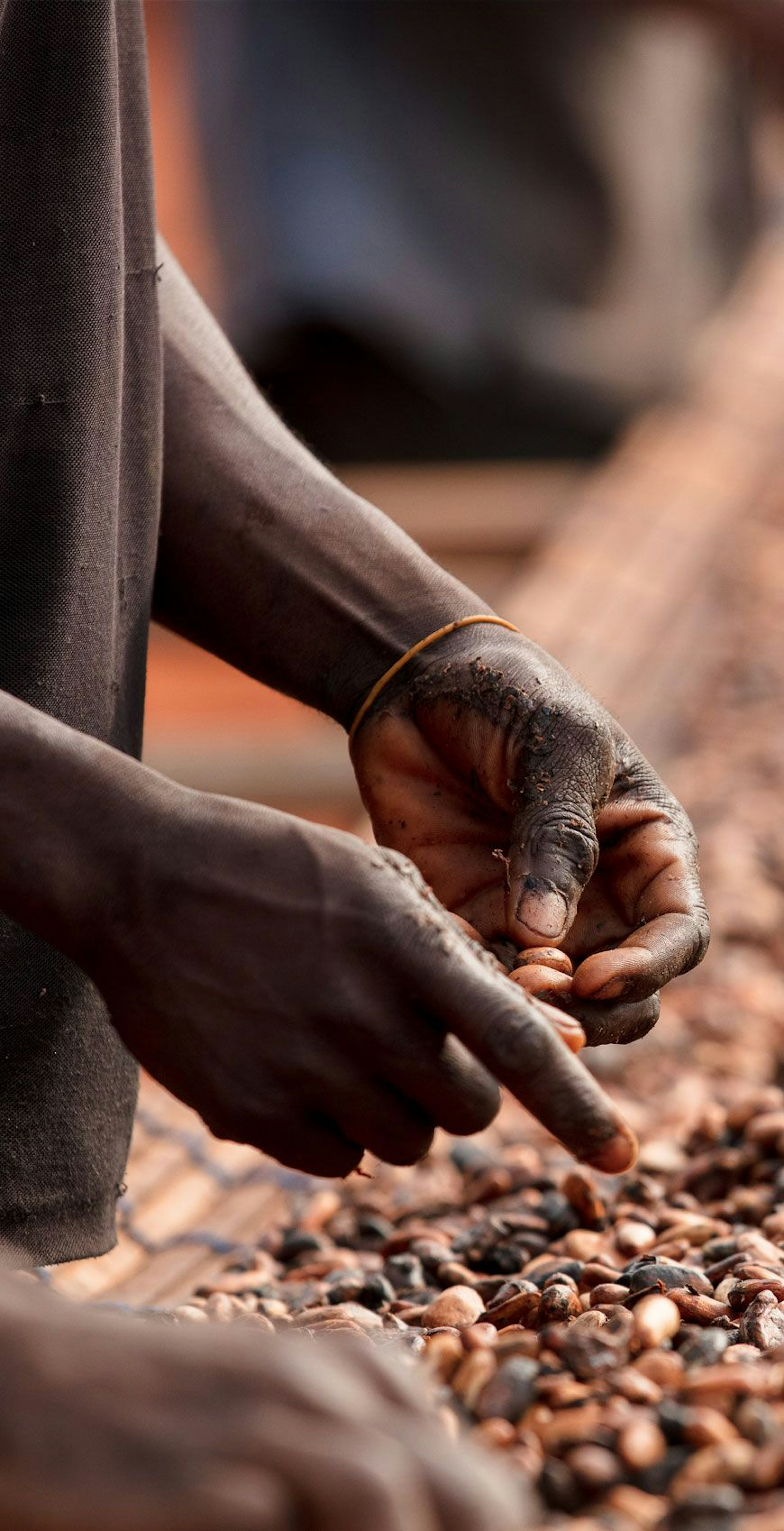Salient Issue
Non-discrimination
The risk of discrimination is present in all organisations and needs close attention in human rights risk assessments. Many people face poorer working conditions, lower pay or even harassment due to their origin or characteristics. Please also see our Gender Equity page.
Discrimination is a salient issue to the supply chains of several products where Fairtrade operates, including tea, cocoa, bananas, sugar and fruits.
Lower wages for migrants, ethnic or racial minorities, or people from indigenous communities have been documented in cocoa, banana, coffee, sugar cane, textile and wine production. In West African cocoa production, immigrant workers from Burkina Faso and Mali often earn far below the national minimum wage and have the highest risk of poverty and forced labour.
On banana plantations in Peru and Ecuador, Venezuelan migrants reportedly receive up to half less than local workers. In Guatemala, Spanish-speaking workers on coffee plantation earn on average 40% more than workers of Mayan descent that speak an indigenous language, a vast majority of whom report not having enough to eat.
Informal or temporary work is also more common among migrant workers, for example Nicaraguan banana workers in Costa Rica or migrant vineyard workers in South Africa. In Sri Lanka, tea workers of Tamil-origin face barriers to promotion. On flower farms in Ethiopia and Kenya, workers report nepotism and tribalism.
Exploitative and abusive labour conditions are more commonly experienced by migrant workers, who are over three times more likely to be engaged in forced labour than non-migrant workers. In India, Dalits face an increased risk of bonded labour in tea and sugar cane production.
Age discrimination has also been documented. On banana plantations in Guatemala, it has been common to dismiss workers over the age of 45 on the grounds of diminished productivity.
Local hostilities can also erupt into xenophobic violence. There have been attacks on migrant workers on Kenyan tea plantations and fruit workers in South Africa.

According to research
Workers see the Fairtrade Premium as “a sign of recognition – an intervention that does not discriminate"
Loconto et al, 2019, page 18.

Action
Fairtrade's Response
Discrimination is deeply rooted in the socio-economic dynamics of many regions where Fairtrade works. We support efforts by farmer and worker organisations to challenge these dynamics and to participate in preventing, mitigating and remediating discriminatory practices.
We believe that farmer and worker-led interventions are most likely to be appropriate for the local context, sustained over time, and impactful.
If discrimination is found or a Fairtrade certified organisation is otherwise non-compliant with Fairtrade Standards, the independent Fairtrade auditing body FLOCERT agrees on corrective actions with the organisation and confirms their implementation.
Discrimination against women is specifically discussed on Gender Equity page.
Fairtrade's response in detail
1: Preventive and mitigating measures
Fairtrade utilises a variety of tools to prevent and mitigate1 discrimination. The Fairtrade Standards are one of the tools and include many requirements regarding non-discrimination:
- Prohibition of discrimination. The Standards prohibit discrimination in recruitment, remuneration, promotion, termination, allocation of work and training, trade union affiliation, committee/cooperative membership, and other activities. This applies to workers employed indirectly via subcontractors as well. The Standards highlight to farmer organisations and plantations2 the typical grounds for discrimination, including gender, ethnic origin, trade union participation and HIV/AIDS status, building on ILO Conventions3.
- Suitable work for all. Potentially hazardous work, such as the application of pesticides, must not be required of children under the age of 18, pregnant or nursing women, persons with chronic, hepatic, renal or respiratory diseases, or persons with incapacitating mental conditions. Where a change of work is necessary, Fairtrade Standards require that the person is offered alternative work.
- Risk assessment and follow up-measures. Farmer organisations and plantations are encouraged to assess and reduce the risk of discrimination. To support these activities, Fairtrade Standards also suggest risk assessment indicators and typical preventive measures.
- Positive action. Fairtrade Standards encourage projects that improve the social and economic positions of disadvantaged groups with the goal of achieving equity in the workplace/cooperative membership and decision-making. These projects can be funded with Fairtrade Premium. For example, in the Dominican Republic’s banana sector, Fairtrade supports the access to healthcare and education for migrant workers and their families.
- Migrant and seasonal workers. Plantations must ensure the same employment conditions and benefits to migrant, local, seasonal and permanent workers. Farmer organisations are also encouraged to achieve this.
- Unionised workers. Workers’ rights to organise and negotiate collectively on wages and working conditions are protected in several ways in Fairtrade Standards. Please see the page on Labour Rights & Conditions for further information.
Find the full set of discrimination-related requirements in the Fairtrade Standards at the bottom of this page.
Even with strong requirements, standards and auditing alone cannot transform discriminatory beliefs, traditions or laws. That is why Fairtrade addresses the root causes of discrimination in several additional ways:
- Awareness raising. Fairtrade engages in various awareness-raising activities with particular attention paid to local contexts and their salient issues. For example, in Ghana and Côte d’Ivoire, Fairtrade raises awareness about sharecroppers’ rights among cocoa producers. This is also reflected in the Fairtrade Cocoa Standard, through new requirements that become applicable in 2024 and 2025 (See page 16). In Latin America, the Fairtrade Producer Network CLAC has produced a video to raise awareness of discriminatory practices with examples of inclusion among farmer organisations and plantations.
- Dialogue with certified organisations. Fairtrade has certified companies in places where discrimination against trade union members and anti-union sentiments are common. Over the years, Fairtrade has called on companies to respect trade union rights, including collective bargaining, and to cease discrimination against union leaders when necessary.
- The Fairtrade Impact Map includes nine ongoing projects that address the rights of vulnerable groups, including women, children and youth. For example, the Fairtrade Coffee Rust Programme focused on building the organisational and community capabilities to increase the participation of under-represented community members. Almost 18 ,000 farmers in 45 smallholder organisations in Guatemala and Honduras were directly supported. In other projects in Ghana for example, the rights of children and vulnerable adults are supported through community-based monitoring and remediation systems. Read more here and here.
- Tailored interventions to support marginalised groups. The COVID-19 pandemic disrupted global supply chains and impoverished many disadvantaged families. Fairtrade took several actions to support smallholder farmers and workers on the frontline of the pandemic, including more than €15 million in funding, which supported over 900 producer organisations in 57 countries. A 2022 study on Fairtrade certification and producer resilience in times of crises found that producers receiving Fairtrade COVID-19 support were on average 19 % less likely to report a high impact of COVID-19 on the lives of their members and workers.
- Proven impact. According to a study on Fairtrade’s impact on rural development, a coffee cooperative in Peru was found to be remarkably conscious about vulnerable members within their communities and to provide them with some support measures. These measures included a fund to support producers who experience the death of a family member and to provide loans with no interest to elderly farmers to enable them to cope with potential health issues. They also had a scheme to incentivise the entry of members of indigenous communities to the cooperative by offering a membership fee at half the regular rate.
- The Fairtrade Premium. Farmer organisations and plantations occasionally invest in projects that benefit the livelihoods or standing of disadvantaged groups and minorities. An overview of the use of Fairtrade Premium can be found here. If plantations distribute some Premium as cash, it must be distributed equitably amongst all workers, including temporary workers.
- Facilitation of co-investment. Fairtrade offers opportunities for retailers, brands, manufacturers and traders to participate and invest in tackling discrimination in the communities they source from. The best practice section of the Fairtrade Trader Standard encourages this.
At the export, import and manufacturing stages, Fairtrade’s interventions to prevent and mitigate discrimination are currently less comprehensive than at the production stage. The Fairtrade Trader Standard requires companies to conduct a HREDD risk assessment, including the identification of vulnerable groups. Furthermore, companies are required to be aware of and comply with national labour laws and fundamental ILO Conventions, including those on discrimination and equal remuneration. This applies in Fairtrade certified supply chains whether or not the local country has ratified these ILO Conventions. Compliance with these requirements is checked in audits if there are any prior indication of non-compliance, such as allegations made by third parties.
In addition, traders are required to pay Fairtrade Premium and Fairtrade Minimum Price, which support farmer organisations and plantations to invest in socio-economic development of the community and workers.
1: Mitigating measures reduce the likelihood of an adverse impact (UNGP Interpretive Guide, p. 12)
2: On this page, we use "plantations" to refer to organisations using hired labour.
3: ILO Convention 111 on Discrimination defines discrimination as “any distinction, exclusion or preference made on the basis of race, colour, gender, sex, religion, political opinion, national extraction or social origin, which has the effect of nullifying or impairing equality of opportunity or treatment in employment or occupation” (Article 1).
2. Remediating measures
Even with best efforts, cases of discrimination can be found in Fairtrade certified supply chains. Discrimination is deeply rooted in global and local socio-economic dynamics and no sustainability initiative can fully prevent it.4
Where FLOCERT, Fairtrade’s auditing body, identifies discrimination or weaknesses in a certified entity’s anti-discrimination work, it requires corrective measures. This could include measures to facilitate remediation5, an anti-discrimination policy, or an action plan or project to prevent further discrimination.
In addition, when severe harm such as gender-based violence, harassment or forced labour is identified or alleged, we act to protect the affected person(s) in line with our Protection Policy6. We work with national agencies and/or NGOs to facilitate a safe workplace and long-term well-being of the victim, and with producer organisation to strengthen preventive measures.
However, Fairtrade cannot guarantee that each violation is fully remediated, including the rehabilitation and compensation for the victim. Full remediation requires contributions from all the duty bearers, including local public authorities and each of the companies who have caused or contributed to the case.
Fairtrade has a global level grievance mechanism – the allegations mechanism housed at FLOCERT – which is under reform to strengthen its alignment with the UN Guiding Principles on Business and Human Rights.
In addition, Fairtrade certified plantations are required to have a grievance mechanism in place. Grievance mechanisms are not yet required of farmer cooperatives or traders, but these organisations do need to address and document any human rights and environmental complaints related to Fairtrade Standards.
4: For some further discussion on this, see this statement on Addressing Racial Inequality by Fairtrade International.
5: Remediation refers to the process of counteracting or fixing a human rights violation through measures that can include apologies, restitution, rehabilitation, financial or non-financial compensation, and punitive sanctions, as well as preventing the repetition or further cases of harm (UNGP Interpretive Guide, p. 12).
6: Fairtrade’s Child Labour and Forced Labour Guidelines.
